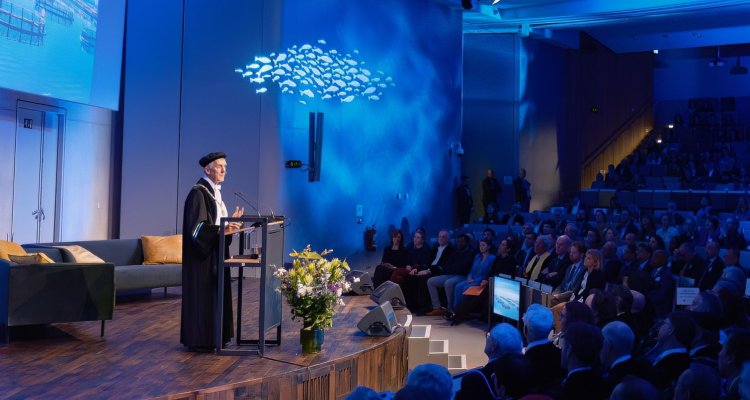105th Dies Natalis of Wageningen University & Research dedicated to sustainable management of sea and ocean
“The twenty-first lustrum of Wageningen University & Research is entitled Shaping Sustainable Futures. It stands for what has been and will be our mission: to make the world a better, healthier, fairer, more equitable and more environmental friendly place.” That is what Arthur Mol, Rector Magnificus and Vice-President of Wageningen University & Research, said in his opening speech of the 105th Dies Natalis of Wageningen University & Research. Mol: “The new Bachelor program in Marine Sciences and WUR’s participation in the newly established Delta Climate Center will contribute to our mission.”
Sustainable management of the increasingly crowded sea and ocean was this year’s theme of the Dies Natalis. The increasing marine challenges require specific knowledge, according to Arthur Mol. WUR is active at the heart of this knowledge domain with research institutes such as Wageningen Marine Research and chair groups, and Mol highlighted the launch of the new Marine Sciences course and the arrival of the Delta Climate Centre in Zeeland, in which WUR participates.
Swedish professor Beatrice Crona spoke in her Dies lecture about the different roles of aquatic food in future food systems, and the challenges of the blue economy and its impact on nature. Crona is Professor of Sustainability Science in Sweden and Science Director of the Stockholm Resilience Centre.
Modelling water pollution, restoring coral
Maryna Strokal MSc took listeners on a journey to the Dnipro River and the Black Sea during her presentation. She used to swim there but nowadays there is too much pollution. At WUR, she leads a team working on modelling water pollution and solutions to pollution. Joshua Wambugu MSc works at the Marine Animal Ecology and Environmental Policy chair groups and presented his work on coral reef restoration. According to Wambugu, there are more and more places worldwide where scientists and local residents are working together towards this goal.
Three honorary doctorates conferred
Three scientists received honorary doctorates during the Dies Natalis for their exceptional academic achievements: Dennis David Baldocchi, Valerie Trouet and Willy Verstraete.
Dennis David Baldocchi is Professor of Biometeorology and Executive Associate Dean of the Rausser College of Natural Resources, University of California, Berkeley. Baldocchi is a driving force behind the global observation network FLUXNET. Valerie Trouet is Professor at the University of Arizona and Scientific Director of the Belgian Climate Centre. She has conducted important research on the correlation between tree rings and climate. Prof Willy Verstraete of Ghent University is an advocate of ‘microbial resource management’ as a path to a sustainable and healthy world. Among other things, Verstraete developed an artificial digestive system.
Research Award for promising researcher
Every year, Wageningen University Fund awards the Research Award to a promising researcher, to a WUR-researcher, younger than 40 years of age, who has published an outstanding and original scientific article in the calendar year preceding the ceremony. During the Dies Natalis 2023, PhD candidate Balwina Koopal was awarded the prize. Koopal received the prize for her interpretation of the function and operation of the so-called SPARTA system, an enzyme complex that detects and stops infections in bacteria.

